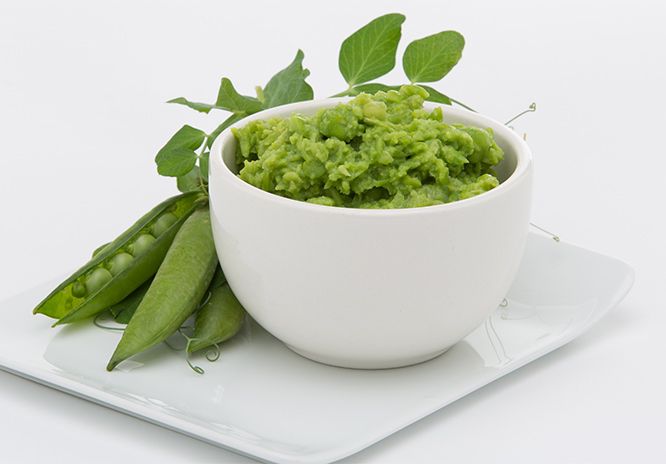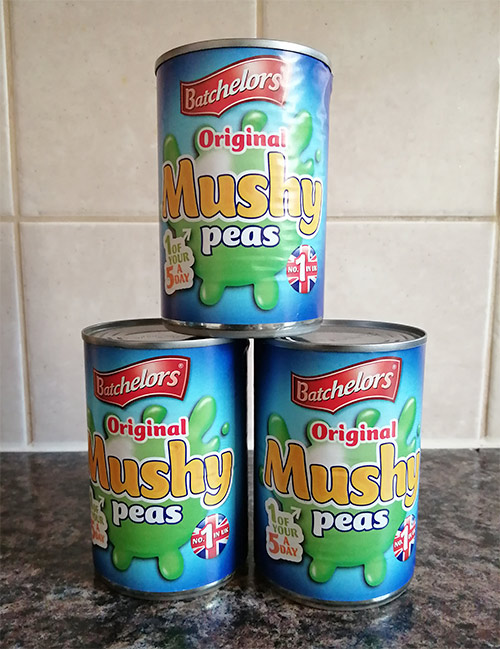
Mushy peas are a classic British dish, often served as an accompaniment to fish and chips. In the north of the country they are also traditionally served with a pie. Because they are mainly dished up with high-fat, calorie-laden meals, many people assume that mushy peas are not good for you. But is this true? Are mushy peas healthier than we think?
We have taken an in-depth look at the nutritional values of mushy peas to determine if they can make a healthy addition to a balanced diet.
What are mushy peas?
Mushy peas are made from dried marrowfat or processed peas. The dried peas are rehydrated in a solution of water and bicarbonate of soda (also known as baking soda) and then simmered in a pan until they become soft and ‘mushy’.
The dish has British origins but is now popular across the globe—and is even popular with celebs—Michael Jackson reportedly requested mushy peas whenever he came to the UK!
Mushy peas are a simple dish to make, but many of us prefer the convenience of buying the canned varieties available in supermarkets.
What ingredients are in mushy peas?
Marrowfat peas are the main ingredient in most varieties of mushy peas. They are green peas that have been allowed to mature in the field (unlike the garden pea which is harvested while young) making them plump and starchy.
All types of processed peas are treated with preservatives, before drying them out ready to be reconstituted with water. Usually, a dye is added to make them look fresher, before being tinned and shipped out to supermarkets.
The colouring used in some of the mushy peas we investigated is E133, commonly known as Brilliant Blue FCF. It’s an EU-approved additive that gives a blue hue to food products.
We found E133 in Batchelor’s, Harry Ramsdens and Aldi Four Seasons tinned mushy peas.
Some mushy peas contain copper complexes of chlorophyll, which is a food colouring agent also known Natural Green 3 or E141. The only brands in our research that do not contain food dyes are Lockwoods, Sainsbury’s and Morrisons.
Depending on the brand, between 90% and 99% of the total ingredients are processed or rehydrated peas. Water, sugar and salt make up the remainder. There are two variations: Lockwoods also add bicarbonate of soda, and Morrisons Chip Shop style mushy peas also contain mint extract. Mushy peas and mint sauce is a popular dish that hails from Nottinghamshire, and mint complements the flavour of peas well.
An overview of mushy pea ingredients
| BRAND/SUPERMARKET | TYPE | INGREDIENTS |
| Lockwoods Cook & Serve Mushy Peas | Frozen | Rehydrated Peas (99%), Bicarbonate of Soda, Pre-Soaked Processed Peas |
| Growers Harvest British Mushy Peas (Tesco) | Tinned | Processed Peas (90%), Water, Sugar, Salt, Colours (Copper Chlorophyllin Complex, Carotenes). |
| Batchelor’s Mushy Peas Original | Tinned | Processed Peas (95%), Water, Sugar, Salt, Colours (E101, E133) |
| Harry Ramsdens Mushy Peas | Tinned | Rehydrated Processed Peas (95%), Water, Sugar, Salt, Colours (Riboflavin, Brilliant Blue) |
| Four Seasons Mushy Peas (Aldi) | Tinned | Processed Peas (95%), Water, Sugar, Salt, Colours: Riboflavin, Brilliant Blue Fcf. |
| Asda Mushy Peas | Tinned | Rehydrated Processed Peas (95%), Water, Sugar, Salt, Colours (Copper Complexes of Chlorophyllins, Carotenes) |
| Sainsbury’s Mushy Peas Twinpack | Frozen | Rehydrated Marrowfat Peas (98%), Salt. |
| Morrisons Mushy Peas | Frozen | Rehydrated blue peas (98%), Salt |
| Morrisons Chip Shop Mushy Peas | Tinned | Marrowfat Peas, Water, Salt, Sugar, Colours (Copper Complexes of Chlorophylls and Chlorophyllins, Carotenes), Mint Extract |

The nutritional values of mushy peas
Protein: The supermarket varieties contain between 4.3g (Asda) and 6.4g (Morrisons) of protein per 100g. This would be a large portion—but would contribute towards the NHS recommended intake of 50g of protein per day for an adult.
Sugar: All of the tinned mushy peas we researched contain added sugar. Lockwoods, who produce frozen mushy peas have no added sugar, making them the healthiest choice if you are looking to cut your sugar consumption. Mushy peas do contain some natural sugars, so look for unsweetened brands on the supermarket shelves.
Fat: Mushy peas are low in fat, making them a good choice for weight loss, as part of a balanced diet. It’s often the food that mushy peas are served with that is calorific—such as fish and chips—but eaten alone the fat content is low, varying from <0.5g to 0.8g per 100g.
Fibre: The fibre content of mushy peas ranges from 1.9g to 7.5g per 100g. Sainbury’s Mushy Peas are the best choice for a fibre boost and will keep you feeling fuller for longer to help prevent snacking between meals. More good news is that the fibre in peas can help to lower cholesterol levels. Peas are cited on the Heart UK website as a food that can help to block some cholesterol being absorbed into the bloodstream.
Salt: According to the NHS Eat Well website, adults should not consume more than 6g of salt daily. This is the equivalent of one teaspoon. Mushy peas contain between 0.1g (Aldi) and 0.52g (Harry Ramsdens) of salt per 100g, so opt for the varieties with the lowest salt content to help keep your heart healthy and minimise the risk of heart disease and stroke.
An overview of the nutritional values of mushy peas (per 100g)
How to make healthy mushy peas at home
Of course, the healthiest way to consume mushy peas is to make you own. That way you will have complete control over the ingredients to ensure they both are tasty and good for you.
Making healthy mushy peas at home is simple and quick to do:
- Add a half a diced onion, 200g petite pois and 350g asparagus to a pan with a half a teaspoon of extra virgin olive oil and leave to simmer for five minutes.
- Add 100ml water, cover cook for a further five minutes.
- Then remove from the heat and blend to your preferred consistency. Simple, fast and healthy!
You can replicate this recipe with fresh, frozen or canned garden peas and marrowfat peas, but fresh garden peas work best. The addition of asparagus to the recipe increases the nutritional value (asparagus is rich in Vitamin K) and also balances out the sweetness of the peas.
The health benefits of mushy peas
Mushy peas provide a good source of fibre which is essential for a healthy bowel and digestive system. A fibre-rich diet can also help to reduce the risk of some types of cancer and diabetes.
They also provide a good source of Vitamin K (22% of your RI per 100g) which plays a key role in bone health and helping blood to clot.
Furthermore, you will also find iron in mushy peas which helps to reduce tiredness and also contributes to a healthy immune system and red blood cell count. A large 100g portion of mushy peas contains 1.5mg iron, which equates to 12% of an adult’s recommended intake.
And the good news doesn’t end there. A bowl of mushy peas is classed as one of your five-a-day. Try eating homemade mushy peas on a slice of wholemeal toast for a balanced lunch that helps to boost your veggie intake.
Mushy peas are low in calories. The tinned varieties range from 72 calories (Asda) to 106 calories (Morrisons) per 100g portion, making them a good choice if you are counting calories as part of a weight-loss program.
FAQS
Are mushy peas processed?
The ingredients listed on the tinned and frozen brands we researched all contain peas that have either been processed or rehydrated. If you’d prefer to consume fresh peas, we suggest making your own mushy peas at home.
Can mushy peas cause bloating or wind?
It’s no secret that peas and beans have a reputation for causing flatulence and bloating. They are slow to digest, which causes the fermentation that leads to gassiness. Most legumes are rich in fibre and therefore increase wind, and mushy peas are no exception.
Are mushy peas ‘free’ on Slimming World?
Yes! There are no Syns in mushy peas.
Our verdict: Are mushy peas healthy?
Mushy peas have a pretty impressive nutritional profile, They are low in calories and fat and provide a significant amount of fibre to promote gut health. However, some of the shop-bought cans do contain added sugar and salt, so we’d recommend checking the labels carefully and purchasing those which have no added sugar or salt.
If you are concerned about consuming food colourings, then frozen mushy peas are the better choice as all the canned varieties we looked at contained either E133 or E141 food dyes.
Having a can of mushy peas in your store cupboard is useful for a quick lunch—try them on a warm flatbread with some toasted pine nuts. But the healthiest choice for weight loss or boosting your five-a-day would be to make your own mushy peas at home.
Author Bio
Kerry Garner has an interest in nutrition and is always on the look-out for new, healthy and exciting snacks for her son’s packed lunch to ensure he gets a balanced diet that’s not boring. She is a keen home-cook and loves nothing more than experimenting in the kitchen and inventing nutritious, yet tasty meals for her family to enjoy.
